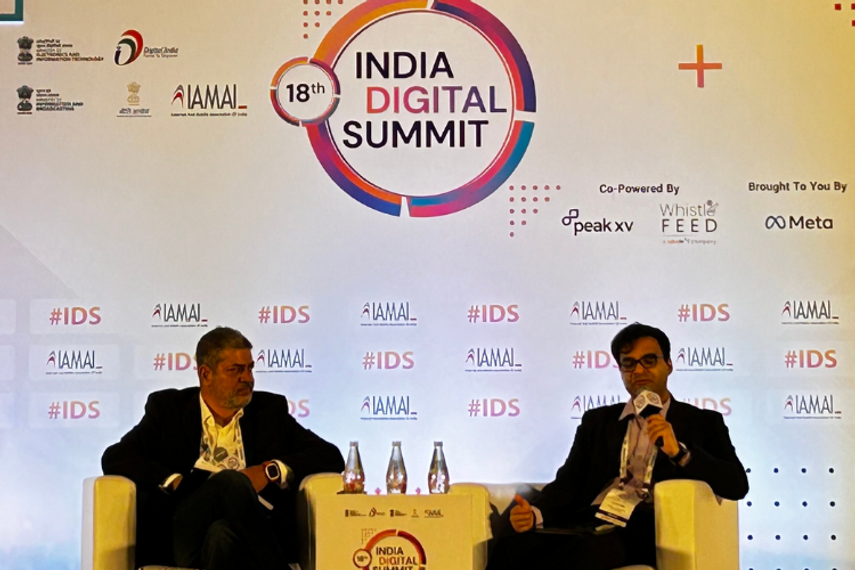
The second day of IAMAI’s India Digital Summit commenced with a fireside chat featuring Arpan Banerjee, India Operations at Alliance For Creativity and Entertainment, and founder of Content Advisory Group. He delved into the hurdles presented by piracy's profitability and its repercussions on industries and society.
The session was moderated by Abhishek Dhoreliya, founder and CEO, MarkScan.
Setting the stage for the discussion, Banerjee emphasised the evolving nature of piracy, which has transformed into a sophisticated global criminal enterprise.
He expressed, "Through lucrative advertising revenue and subscription models, piracy networks earn large sums worldwide, with India as a significant contributor. This results in financial and job losses for industry and potential revenue losses for the government, and undermines societal well-being. Many piracy sites are also patently unsafe, as they contain links that lead to malware."
Over the past few years, ACE has disabled piracy networks around the world, including in India, through a range of methods, such as takedown notices, criminal referrals to law enforcement authorities, and civil litigation.
During the fireside chat, he pondered on two key aspects: understanding the challenges in combating piracy and disrupting the revenue streams that sustain it.
Profits from illicit platforms
Banerjee stated, “On the revenue front, it's evident that illicit platforms generate staggering sums. This profitability is particularly striking when we examine cases closer to home.”
Sharing case studies of India-based piracy sites, Banerjee revealed, "Extra Movies, a notorious network offering thousands of movies and TV shows from Hollywood, Bollywood and beyond. Despite a Delhi High Court order against it, the website continued operations and attracted 1.3 million monthly users worldwide. ACE identified the location of the operator and his revenue generation methods, which included advertisements and a coupon purchase system. The operator eventually admitted involvement and surrendered his domains and administrative passwords to ACE."
Next, Banerjee discussed the case of an India-based piracy website called WatchWrestling.ai, which attracted 250 million global visitors annually.
"The website initially focused on streaming pirated broadcasts of wrestling matches and combat sports, but later expanded to other sports like baseball, basketball and American football. Again, ACE tracked down the operator, who agreed to disable the website and hand over the domain to ACE. Finally, Banerjee spoke on the risks emanating from “piracy-as-a-service” operators in India, such as rogue cyberlockers set up with the primary purpose of hosting pirated content. These operators amass significant traffic, and leverage advertising revenues and account registrant fees to generate large profits,” Banerjee stated.
According to Banerjee, piracy thrives due to its profitability and relatively low barriers to entry.
He conveyed, "There had been multiple cases where pirates have funded extravagant lifestyles through illicit gains, including in the case of a high-profile prosecution in the US. It is thus obvious that combating piracy requires targeting revenue streams."
Impact on society
Banerjee went on to share a forthcoming study conducted by the Indian School of Business (ISB) in collaboration with Professor Paul Waters, a cybersecurity expert based at LaTrobe University in Australia, which sheds light on the prevalence of malware on piracy websites.
He stated, “The study gathered consumers' perceptions on piracy-malware linkages through surveys, and then empirically measured these linkages. The findings showed that the actual risks associated with visiting such sites were significantly higher."
Eradicating piracy necessitates coordination
Ending the discussion, Banerjee shed light on the importance of law enforcement and government authorities prioritising copyright enforcement.
Banerjee referred to government reports in India that lamented that copyright enforcement is not accorded high priority. He also cited a report by the Parliamentary Standing Committee on Commerce and Industry, which has called for the establishment of a centrally administered, inter-ministerial committee to better coordinate enforcement and assist copyright owners.


.jpg&h=334&w=500&q=100&v=20250320&c=1)
.jpg&h=334&w=500&q=100&v=20250320&c=1)
.jpg&h=334&w=500&q=100&v=20250320&c=1)


.jpg&h=334&w=500&q=100&v=20250320&c=1)





.png&h=268&w=401&q=100&v=20250320&c=1)


.jpg&h=268&w=401&q=100&v=20250320&c=1)



